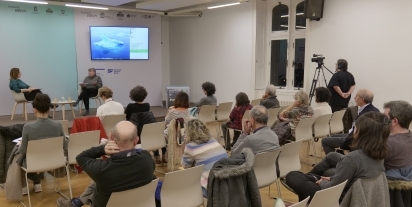COP29: A de minimis climate financing agreement in transition towards COP30 in Brazil
COP29, held in Azerbaijan in November 2024, managed to establish a new climate finance goal, as the main outcome, and to reach breakthroughs on the carbon markets, as María José Sanz, the Scientific Director of BC3, Basque Centre for Climate Change, explained. Furthermore, progress was made as far as possible on the Global Goal on Adaptation and on the Gender Agenda.

Yet again this year, María José Sanz took part in an event at the Donostia Sustainability Forum to take stock of the latest United Nations Conference on Climate Change. "Those multilateral processes are often not well understood, and expectations are created in processes whose mission is not to prevail over the sovereignty of any government. Their mission is to generate collective discussions among countries to reach agreements to steer public policies towards a collective target set by the Paris Agreement, which is to hold the increase in temperature under 2ºC, or even, for greater safety, under 1.5 degrees", she explained. In her opinion, COP29 has been a transition summit towards a meeting expected to be more important, and which will be held in Brazil in 2025
Mitigation is not progressing
María José Sanz pointed out that it was essential to remember that these discussions were based on science. The IPCC, the panel on climate change experts, articulates existing scientific knowledge to provide clear indications; it likewise confirms that the causes of climate change are largely anthropogenic, driven by our development model and greenhouse gas emissions.
As she spelled out, global emissions continue to grow despite some progress in lowering emissions in certain countries. Even though certain decoupling has been observed between economic growth and the emissions in some economies, this process is not going at a faster enough pace to meet the Paris Agreement targets. There is a pressing need to act, she added, regarding the impacts of climate change, which are multiplying as the global temperature increases.
Climate financing
The finance agreement was reached with the wealthy countries committing to contribute at least USD 300 billion per year by 2035 to lower-income countries. When the private contributions are added, the global commitment stands at USD 1.3 trillion [1012] for poorer countries to be able reduce their emissions, progress towards low-carbon economies and adapt to the effects of climate change. This figure is much lower than the one the Global South countries were calling for – and which is acknowledged is needed – but "it triples the financing previously approved", which is an achievement in itself, she added.
Sanz recognised the need to capitalise on private investments and for international financial institutions to restructure and adapt to climate financing needs. She went on to stress the importance of transparency and urgency in the availability of the funds.
Carbon markets
Carbon markets, designed as a flexibility mechanism to facilitate the transformation towards a low-carbon economy, were a subject of discussion given their potential to be used as a tool to drive the cutting of emissions.
COP29 made progress in defining standards to improve the environmental integrity of carbon markets, particularly as regards carbon sink projects; clearer guidelines were established to align the market instruments with the Paris Agreement goals, along with better guides to measure emission reductions, as María José Sanz explained.
Other advances
COP29 also achieved advances in other areas, such as the Global Goal on Adaptation, the Gender Agenda, and the Loss and Damage Fund. A work programme was launched for the Global Goal on Adaptation, with a focus on defining indicators. Furthermore, the gender work programme was renewed, recognising the importance of gender equality in the fighting climate change. Furthermore, new commitments were put forward for the Loss and Damage Fund, including regional government contributions for the first time.
Taking Stock and Moving Forward
Even though COP29 did not achieve significant progress in some areas, María José Sanz believes that it paved the way for future negotiations. Climate financing has become a central issue on the global agenda, and the commitment to triple the financing for developing countries is an important, albeit insufficient step.
The researcher likewise stressed that the participation of non-state actors, such as regional governments, is emerging as an avenue to complement the action of the national governments. She also stressed civil society's potential to drive the transformation of the private sectors based on the services and products that it demands and consumes.
The success of future COPs, she added, will also depend on the countries' ability to overcome cultural differences, diverging interests and distrust, and to build a shared vision for a sustainable future. “We hope that the circumstances next year will be a little more suited for an agreement that is perhaps more extensive on the issues that are now on the table”.
COP30, which will be held in Brazil in 2025, will face large challenges. The countries must renew their commitments to reducing emissions and seek greater ambition, the BC3 Director explained. It will be a crucial summit to determine whether the climate financing commitment leads to specific actions. COP 30 is also expected to drive progress in areas related to forests and adaptation, given the summit's location in the Amazon.


